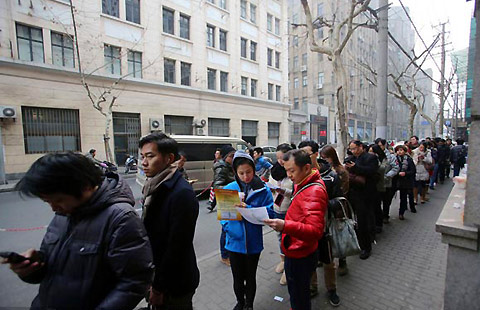RMB slump worries overblown, two-way fluctuation expected
(Xinhua) Updated: 2015-02-06 17:38Two-way movement
The RMB has witnessed regular two-way movement since February after hitting a historical high of 6.04 in mid-January last year.
Many experts believed that the value of RMB has reached an equilibrium level. The central parity of RMB fell 0.36 percent against the dollar in 2014.
In China's spot foreign exchange market, the yuan is allowed to rise or fall by 2 percent from the central parity rate set by the authorities each trading day.
"The depreciation of RMB against the dollar will not last for long, as China is pushing forward the RMB internationalization, and a sharp depreciation will make RMB lose some appeal to other economies," said Ou Minggang, director of the International Finance Research Center at the China Foreign Affairs University.
RMB has overtaken the Canadian and Australian dollars since November 2014 to enter the top five world payment currencies, trailing only the Japanese yen, British pound, euro and US dollar, according to the Society for Worldwide Interbank Financial Telecommunication (SWIFT).
Room for further RMB depreciation against the dollar is "limited in the near term" and a stable currency with two-side volatility remains a preferred option for the Chinese central bank, said JP Morgan China Chief Economist Zhu Haibin.
"The impact of currency depreciation on the export sector might be limited. To start with, small depreciation will only have limited impact," said Zhu, adding that large depreciation will lead to competitive devaluation from other countries, which will compromise the initial purpose of currency depreciation.
Some economists argued that significant RMB depreciation will cause intensified capital outflows. China has a posted deficit on its capital and financial account for three consecutive quarters due to rapid increases in overseas investment and speculation of further RMB depreciation.
Zhu predicted that the most likely scenario in 2015 is for RMB to trade within a range, at between 6.1 and 6.3 against the dollar, and stay unchanged at around 6.15 by the end of 2015.
Chief economist with Bank of Communications Lian Ping forecasts the RMB will stage a two-way movement in trading against the dollar within a range between 6 to 6.4 this year, saying "drastic ups and downs in 2015 are unlikely to happen."
The central parity rate of the RMB strengthened sharply by 105 basis points to 6.1261 against the dollar Friday.
"Investors should not hold a skeptical attitude towards the capability of Chinese central bank to shape the market expectations about RMB exchange rates," said Liu Yuhui, an economist at the Chinese Academy of Social Sciences.
- China stocks down for 3rd day
- 7% or less, no nightmare for Chinese economy or the world
- Tencent, Alibaba mobile payment spat
- Shandong's signature food leaves global marks
- China takes 10% of global rail export market
- Apple narrows market share gap with Xiaomi
- China can help world with infrastructure experience and investment: economist
- Alibaba's Ant Financial to buy 25% of India's One97

















